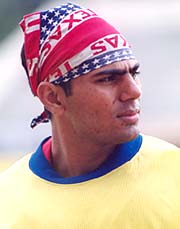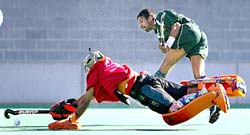Home > Sports > Interviews
The Rediff Interview/Devesh Chauhan
'My confidence levels are steadily shooting up'
September 02, 2003
 A young and talented rookie is always impatient to make a mark. But with experience and proper guidance he matures into a complete player and sets himself realistic goals. Devesh Chauhan has blossomed into the complete goalkeeper, having successfully graduated from junior to senior ranks.
A young and talented rookie is always impatient to make a mark. But with experience and proper guidance he matures into a complete player and sets himself realistic goals. Devesh Chauhan has blossomed into the complete goalkeeper, having successfully graduated from junior to senior ranks.
Coming from the bylanes of rural Uttar Pradesh, Chauhan started off as a forward, when he was fourteen, for his school, Islamia Inter College, before his good height and healthy physique was spotted by the school coach, who advised him to take to goalkeeping. Now 180 centimetres, he literally stands tall under the crossbar and, without doubt, is enjoying ever moment doning the India colours.
With each event Chauhan is steadily mastering the art of guarding the goal and terms former India goalkeeper A B Subaiah's appointment as goalkeeping coach as the turning point in his career. In an exclusive interview with Nagraj Gollapudi, the 22-year-old talks about his 'keeping' and India's campaign in the Champions Trophy.
How important has the role of goalkeeper become in modern hockey?
The goalkeeper is a vital link in modern hockey. Previously, with the off-side rule, there were not many invasions, but with the abolition of the off-side rule in modern hockey, the opposition carries out many tries. If you can can stop about six out of ten tries, the face of the game can change.
What difference has the goalkeeping coach [A B Subbaiah] made?
With his experience as goalkeeper for long, Subbaiah understands the difficulties I face. Since he has been there already it is easy for him to tailor the changes. Our biggest concerns were defending penalty-corners against big teams, like Australia, Germany, the Netherlands and Pakistan; communication between the goalkeeper and the defenders and tackling a charging opposition like the Dutch and Germans. He [Subbaiah] made a very good point of telling me to charge forward instead of remaining static and that has helped me a lot in stopping many a goal.
In the Champions Trophy you were kept busy by the charging opposition. Was this because of a weak defence?

|  | 
'My aim now is not to allow Sohail Abbas to beat me in the goal in the forthcoming Asia Cup'
|  |
|
I would say a weak central line, where many mistakes took place. That allowed the opposition to make forays into our 'D'. That puts a lot of undue pressure on the backline [defence] and goalkeeper; penalty-corners are conceded. A very good example of this was in the bronze medal clash against Pakistan: we conceded as many as eight penalty-corners. Now, if you give an ace shooter like Sohail Abbas those many chances then we can't dream of winning the game. I have observed that our central line is too exposed, and the opposition, on the counter attack, has found it easy to pierce through the central defence. Now, only if our guys are more agile and can thwart the opposition and alter the line of the foray, say outside the flanks, that can help our defence gather themselves in time and help us avoid these defeats, which, in the final count, have proved to be very crucial.
But Abbas could only score two goals against India… were you happy?
I was not happy to even let those two goals in. I have been getting better with experience and people were appreciating my game when it comes to saving penalty-corners. So I was very angry at myself for not having stopped those two goals, as that would have won us the medal. My aim now is not to allow him [Abbas] to beat me in the goal in the forthcoming Asia Cup.
You were one of the stars for India, and also of the tournament. What changes did you carry out in your gameplan?
 During the preparatory camp in Lucknow we [Subbiah, along with the goalkeepers and coach Rajinder Singh] had worked a lot on various strategies to tackle the likes of Sohail, Jorge Lombi (Argentina) and Brian Lomans (The Netherlands). An hour was daily dedicated to the bowling machines, which used to fire balls at speeds above 140mph in different directions -- left top, left down, right down, right top, high over the net -- cross shots, and shots similar to those taken during actual penalty-corners were practiced daily. That helped a lot during the matches and I could easily try and ward off any danger.
During the preparatory camp in Lucknow we [Subbiah, along with the goalkeepers and coach Rajinder Singh] had worked a lot on various strategies to tackle the likes of Sohail, Jorge Lombi (Argentina) and Brian Lomans (The Netherlands). An hour was daily dedicated to the bowling machines, which used to fire balls at speeds above 140mph in different directions -- left top, left down, right down, right top, high over the net -- cross shots, and shots similar to those taken during actual penalty-corners were practiced daily. That helped a lot during the matches and I could easily try and ward off any danger.
As per modern standards, are you well-equipped?
Yes, and I am grateful to my sponsors OBO, the New Zealand company, which has given me the best equipment a goalkeeper needs. They approached me during the last edition of the Champions Trophy in Cologne, Germany, and in the last one year I have got two kits.
What goes through your mind when a short-corner specialist like Sohail Abbas is standing in front of you?
So far I have observed that it all comes down to how you fare when he [the penalty corner specialist] takes the first shot. If you can stop his first attempt then he loses a bit of confidence and you immediately gain an upper hand.
During an Indo-Pak clash, do you think strategy takes a back seat?

|  | 
'I will say the last six months have been the turning point of my life'
|  |
|
[Laughs] Not at all. People may think so, as both the teams' style of playing hockey is similar. I would say, to do well against any team -- not only Pakistan -- we should avoid giving penalty-corners, and for that our central defenders can't just lie idle and let the opposition forwards dodge them. If that happens, then a skillful forwardline, like Pakistan or the mercurial Dutch and Germans, can easily leave us far behind. How do you handle pressure?
Well, it changes from match to match. According to me, the biggest asset a goalkeeper needs to have is confidence, and, I think, my confidence levels are steadily shooting up from match to match.
There were times when you tended to get emotional and got carried away. Have you gained control over those traits now?
I will say the last six months have been the turning point of my life. As I have been playing more and more competitive hockey against big teams my confidence has risen and, in the process, I have learnt to control my emotions. Also Subbaiah has made a world of difference; he is always there to tell us what went wrong, what are the improvements he detected. All that talking helps the player in getting geared up for the next game.
Can you give an example?
Like the stroke I saved against Australia: I waited for him [Brent Livermore] to make his move, and when he was just ready to take the shot, I guessed it was left down and it proved to be right. In the previous match against Germany, I had messed up by moving early and that gave the opposition player the advantage to shoot freely. Subbaiah observed that and advised me not to move till the other player makes his move... and it worked.
Any weak areas you and Subbaiah are working on?
Yes, we have observed that my stance while defending penalty-corners is stiff and am not flexible enough to bend on either side of the body to save the shots. We are trying to correct that.
Finally, who is your best goalkeeper and why?
Dutchman Ronald Jansen. What attracts me is his calmness under the bar. He is never disturbed or scared. He played the final of big events like the Champions Trophy, World Cup and the Olympics like they were practise matches, which showed his confidence. And I am trying to learn from him. Initially, when I started playing international hockey I was very eager to get things done and used to unnecessarily charge and dive, but now with experience I am learning to stay calm and composed and avoid blunders.